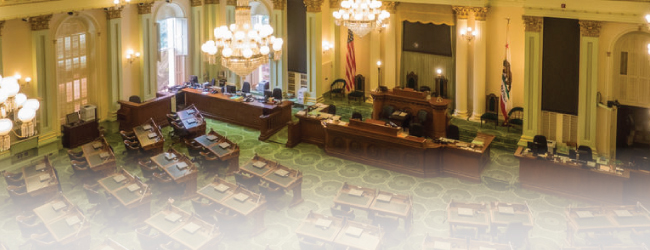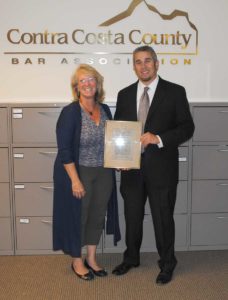
Local Idea: National Impact
Editors Note: This issue features the Conference of California Bar Associations (CCBA), not to be confused with the Contra Costa County Bar Association (CCCBA).
It began as a local issue. In the process of overhauling the Contra Costa County Bar Association website in 2009-10, I realized how important our Lawyer Referral Service is to members of the public and to the CCCBA. It was crucial to highlight our program and make it more accessible through the website. Once the new website was launched, I took on the role of vice-chair of the CCCBA’s Lawyer Referral and Information Service Committee, which establishes the rules and procedures of the Lawyer Referral Service (LRS) and oversees it.
1. Identifying A Problem
The director of the CCCBA LRS, Barbara Arsedo, raised a question that had come up with some callers to our program: were their communications with CCCBA staff privileged? In researching the issue, I found a gaping hole in protections for the LRS program and the public that used it. Although requests to the LRS were clearly made to obtain legal counsel, those communications were not expressly covered by any privilege (though we did have an internal policy of keeping them confidential). As a result, we could not reassure clients of the CCCBA’s LRS that their communications with us would be privileged and safe from discovery by any adverse party, which naturally constrained some callers’ willingness to work with us and share information, and our staff’s ability to get clients the best possible referral.
2. Drafting A Resolution
That’s where the Conference of California Bar Associations became involved. I wanted to assure that communications to the LRS were privileged, but understood that any change to the Evidence Code would have to be drafted carefully. The change needed to be narrowly drawn in a way that would be acceptable to prosecutors, criminal defense attorneys, civil litigators, and the judiciary. Not an easy feat.
I drafted a proposal that would apply only to Lawyer Referral Services certified by the State Bar of California and operating in compliance with section 6155 of the Business and Professions Code. It also applied to an enterprise which the client reasonably believed to be a certified Lawyer Referral Service.
The resolution defined client and defined “confidential communications” between a client and a Lawyer Referral Service. The resolution proposed California Evidence Code section 966 et seq., which grants the client a privilege to refuse to disclose, and to prevent another from disclosing, a confidential communication between the client and the Lawyer Referral Service. The people authorized to assert the privilege are: (1) the client, who is the holder of the privilege; (2) a person that the client has authorized to assert the privilege; and (3) the Lawyer Referral Service or its staff.
The Lawyer Referral Service is not allowed to raise the privilege if there is no holder of the privilege in existence or if the client or client’s representative has instructed the Lawyer Referral Service to disclose the information. Unless one of those conditions exists, the Lawyer Referral Service may not disclose any information provided by the client as part of the referral process.
In addition, no privilege attaches if the Lawyer Referral Service is asked to enable or assist in the commission of a crime or a fraud. When a Lawyer Referral Service staff member receives a confidential communication in processing a request for legal assistance, and reasonably believes that disclosure of the confidential communication is necessary to prevent a criminal act that reasonably appears likely to result in the death of, or substantial bodily harm to, an individual, the communication is not privileged and may be disclosed.
I brought my resolution to the CCCBA Board of Directors, which agreed that CCCBA could be the sponsoring delegation. The resolution passed the Conference of California Bar Associations in 2012, with very strong support from the diverse group of attorneys. The next year, the Conference lobbyist found a legislator to sponsor the resolution as a bill in the California legislature, and I went to testify in favor of it at committee hearings in Sacramento. It was later passed by the California Legislature with nearly unanimous support and signed into law by Governor Jerry Brown on August 19, 2013.

3. The National Impact
California’s changes are, however, not the end of the story. Drafting the resolution for the Conference of California Bar Associations led me to draft a similar resolution for consideration by the American Bar Association (ABA). At its annual meeting in 2016, the ABA adopted Resolution 106, which provided “RESOLVED, That the American Bar Association urges federal, state, tribal, and territorial courts and legislative bodies to adopt rules or enact legislation to establish an evidentiary privilege for lawyer referral services and their clients (“LRS clients”) for confidential communications between an LRS client and a lawyer referral service, when an LRS client consults a lawyer referral service for the purpose of retaining a lawyer or obtaining legal advice from a lawyer.”
Since then, Utah and New York have adopted similar provisions establishing an evidentiary privilege for lawyer referral services and their clients. Wisconsin is on the verge of adopting such a privilege, and more states are examining the issue and seem likely to create similar privileges. And it all started in the Contra Costa County Bar Association.